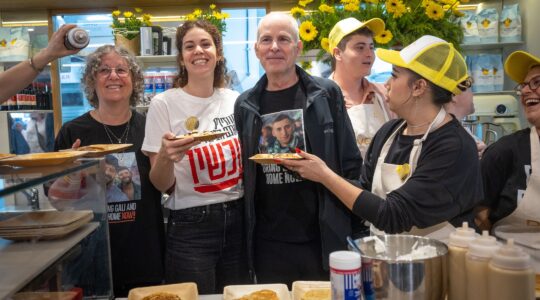RAANANA, Israel (JTA) — Chani Lerner-Mor’s political activism began on a street corner here in 1993.
The landmark Oslo Accords had been signed recently, ceding parts of the West Bank to Yasser Arafat’s Palestine Liberation Organization. The daughter of a Likud Party activist, Lerner-Mor, then just 9 years old, helped set up a local street protest against the agreement. By 18 she had joined Likud; she has voted for its candidate in every subsequent election.
When this year’s campaign began, Lerner-Mor again hit the streets of Raanana. But this time she was handing out fliers for the right-wing, religious Zionist Jewish Home party and its leader, Naftali Bennett.
“I was very disappointed and I said maybe I’ll look in other places,” Lerner-Mor said. “I went to Bennett, read his platform. I was very impressed.”
Israel’s first three decades were controlled by one party — David Ben-Gurion’s Mapai, a precursor to Labor that won every election. For the next 30 years Labor and the right-wing Likud dominated the polls, together accounting for about two-thirds of the vote in five straight elections.
But in recent years, Israel has seen a dramatic increase in the success of newer parties. Current polls predict that three parties that didn’t even exist three years ago — Kulanu, Yesh Atid and Yachad — will together take about 20 percent of the vote, or approximately 24 of the Knesset’s 120 seats, in elections scheduled for March 17. Likud, the party led by Prime Minister Benjamin Netanyahu, and Labor would see their total share drop to just over one-third.
The shift stems partly from a kind of personality politics unseen previously in Israel. In 2013, Yesh Atid, running in its first Knesset election, finished second overall with 19 seats driven in large part by the appeal of its charismatic leader, Yair Lapid.
Israelis now talk about voting for party leaders, not slates or platforms. Jewish Home ads urge voters to “vote Bennett,” while Netanyahu tells Israelis that the choice is between him or Isaac Herzog and Tzipi Livni, the leaders of the center-left slate calling itself Zionist Union. And Herzog and Livni have rallied under the banner “It’s us or him,” referring to Netanyahu.
“People deal with parties in Israel as if it’s a choice between individual people,” said Hebrew University political science professor Gideon Rahat. “There’s a drop overall in trust in parties, and it’s directed generally at the old parties. Young, new politicians offer a new politics.”
Longtime Likud and Labor loyalists are also feeling the change. Their ideological commitments have stayed constant, but the adult children of these staunch Likud and Labor voters are often choosing newer parties to represent their interests. Here are stories of three families that exemplify this generational shift reweaving the country’s political tapestry.

Chani Lerner-Mor voted for the Likud Party in every Israel election until this year, when she threw her support to Jewish Home. (Ben Sales)
The Lerner Family
It was a night of fear that made Lerner-Mor a Jewish nationalist.
She was only 5, months away from moving back to her native Israel from Detroit, where her parents had moved for work. She remembers her drunken next-door neighbor trashing his house after his wife left him, then charging across their lawn with a pistol, banging on their front door and shouting, “You dirty Jews! You destroyed my house!”
Lerner-Mor already felt out of place in America, uncomfortable when Christmas music played in the mall. But that night, when her family had to jump in their car and flee to her grandmother’s house, underscored the importance of a Jewish state.
“This is our home,” Lerner-Mor said. “We have nowhere else to go, so we need to keep it.”
Lerner-Mor, 30, who spent her teenage years attending protests against the peace process, says that same philosophy used to animate the Likud. But she feels the party has lost its conviction in recent years, especially as Netanyahu has voiced support for a Palestinian state and agreed to negotiate with the Palestinian Authority.
Her turning point came in 2012, when Netanyahu ended eight days of airstrikes on Hamas in Gaza without launching a ground invasion. In the next round of fighting two years later, Bennett took a harder line. Lerner-Mor appreciated that Bennett opposed the release of Palestinian prisoners to jump-start peace talks in 2013 and vehemently rejects territorial compromise in the West Bank.
“Bennett is the one who represents the nationalist camp,” Lerner-Mor said. “People are going to Jewish Home. There’s a clear voice coming out that we don’t apologize. With the Likud, we know what they say, but they stutter sometimes.”
Lerner-Mor, now a voice instructor who has remained in Raanana, was raised by a religious father and nonreligious mother. Lerner-Mor calls herself “traditional” and appreciates Jewish Home’s emphasis on Jewish values and history. Her mother, brother and husband, she says, have also thought of switching to Jewish Home.
But Lerner-Mor’s father is sticking with Likud. Aaron Lerner also became involved in politics after the Oslo Accords. He organized local protests and ran for the Likud Central Committee, the party’s governing body, whose meetings he found to be a cross-section of Israeli society. He describes one in which a woman in a short skirt argued policy with a haredi Orthodox man — a scene that to him showed Likud’s breadth.
“The Likud is neutral territory,” Lerner said. “No one has the right to impinge on another person’s religious standing.”
Such diversity, says Lerner, is why Likud will always be the right-wing’s standard-bearer. He dismisses suggestions that the party has drifted leftward, saying Netanyahu’s declaration of support for Palestinian statehood comes with the subtext “if pigs could fly.”
“Netanyahu paid his dues and delineated conditions on a Palestinian state that are either unacceptable to the Palestinians or are such that you don’t actually have a sovereign state,” he said. “I have my misgivings about the tactic, [but] I don’t see Netanyahu as someone who supports a sovereign Palestinian state.”
While father and daughter disagree, Lerner-Mor says she doesn’t “shoot friendly fire.” They both hope Netanyahu will win another term as prime minister and lead a right-wing coalition government. And Bennett?
“Maybe next time,” Lerner-Mor said.

Rafael Nahum and his wife, Doris, are loyal Labor Party voters. But their son, Momi, supports Yesh Atid, a relatively new centrist party with a charismatic leader. (Ben Sales)
The Nahum Family
The year before Israel was founded, Rafael Nahum’s father was already thinking about aliyah. A shepherd in Libya, he came as a tourist to British Mandate Palestine, where he managed to meet David Ben-Gurion and obtain a permit to return with his flock.
The family arrived in 1951 as part of a massive immigration of 30,000 Libyan Jews to the Holy Land. Like other immigrants, they lived in a tent in the newly founded development town of Or Yehuda, braving floods and subsisting on government rations.
More than 60 years later, Nahum, 72, still lives in Or Yehuda, now a middle-class suburb of Tel Aviv. He remains grateful to Ben-Gurion for allowing the family to bring over its flock and for absorbing waves of new immigrants in the state’s early years.
“Ma’arach started this state, it built it,” said Nahum, who works for the Or Yehuda municipality, using the name for another precursor to the Labor Party. “Ben-Gurion established this state, and everyone who accompanied him thought about what would be in 50 years. The governments today don’t think about what will be in 50 years.”
Like many Israelis, the Nahums are skeptical about the chances for peace and accuse the Palestinian leadership of intransigence. But Rafael approaches the Palestinian issue with pragmatism. After so much war, he says, maybe it’s time to move toward compromise.
“From the creation of the world there was war,” he said. “At a certain point there needs to be an end. You need to come talk to them.”
The Nahums passed on their center-left politics to their son Momi, 47, who works in Israel’s high-tech industry and like his parents was once loyal to Labor. Momi still places a premium on party leadership, but this year the leader he finds most appealing is Lapid, head of the 3-year-old centrist Yesh Atid party.
“Lapid is making courageous decisions,” Momi said. “He had rare courage to assign the hardest ministries [to his party members]. The fact that he didn’t give up and kept going is a badge of honor.”
Momi says his shift has little to do with ideology. Everyone from Likud leftward, after all, has declared support for Palestinian statehood.
“The borders have blurred,” he said. “The choice is more personal because everyone is saying the same thing. There’s no reason for this scattering of so many parties.”
The Simantov Family
One month before Prime Minister Yitzhak Rabin was assassinated in November 1995, Danny Simantov could already sense trouble. Ever since the Oslo Accords had been signed, tensions had been on the rise.
Though he was only 10 years old, Simantov, now 29 and a developer in a computer programming firm, remembers the October rally in Jerusalem’s Zion Square showing a poster of Rabin in a Nazi uniform.
“In the ’90s, the state broke up in general,” he said. “The extreme right was there. I saw it as a kid. You walk around Zion Square, you see these things, and that gives you a political direction.”
Though his mother was a staunch Likudnik, Simantov became a Labor activist, hoping that the party could restore the country’s social cohesion. For the 1999 election campaign, Simantov tried to expand the party’s base, canvassing streets in poor neighborhoods and setting up booths at busy intersections.
Labor won that election, but it has lost every one since. By 2013, Simantov felt his mission had failed.
“This party has a problem,” he said. “It can’t bring voices that aren’t from its own camp. To make a real change you need to draw the nationalist people who vote for Jewish Home and Likud.”
Simantov, a traditional Jew, believes that Kulanu, a new party founded by former Likud minister Moshe Kachlon, is better poised to attract low-income voters Labor can’t reach. Kulanu has eschewed talk of peace and war in favor of economic reforms to benefit low-income Israelis.
Kachlon grew up poor, which Simantov thinks will enhance his appeal among Israelis of limited means.
“It’s a party that will work for the weaker classes,” he said. “The idea of social mobility, to move from a low class to a high class, that’s how I see the party — a party that can talk to regular people, that can lower cost of living, support education in development towns, that can attract that population.”
Simantov’s shift to Kulanu pleases his mother, a longtime Likud voter who appreciates Kachlon for the same reasons as her son. But Esther Simantov is sticking with her old party. Raised in haredi schools, Esther grew up in a traditional home and was inspired by former Israeli Prime Minister Menachem Begin when his Likud beat Labor in 1977 by drawing the votes of Sephardic and religious Jews.
Esther Simantov worked in Begin’s office after his victory and was in charge of his mail. She remembers his modest demeanor and his habit of greeting whomever he met in the elevator.
“He really helped people,” she said. “He cared about the little guy. He cared about the whole people, not just one population.”
Esther Simantov shares Netanyahu’s skepticism of the Palestinian leadership and believes Likud has maintained Begin’s mantle of caring for the lower classes. In supporting Kachlon, she says her son is embracing similar principles, especially because Kachlon once was a Likud member.
After the ballots are cast, Esther Simantov expects Kachlon to partner again with his old party.
“Kachlon is the Likud,” she said. “They’ll go together in the end. I don’t think you can break that connection. I appreciate what he did, and I think he needs to go back to the Likud.”
JTA has documented Jewish history in real-time for over a century. Keep our journalism strong by joining us in supporting independent, award-winning reporting.





